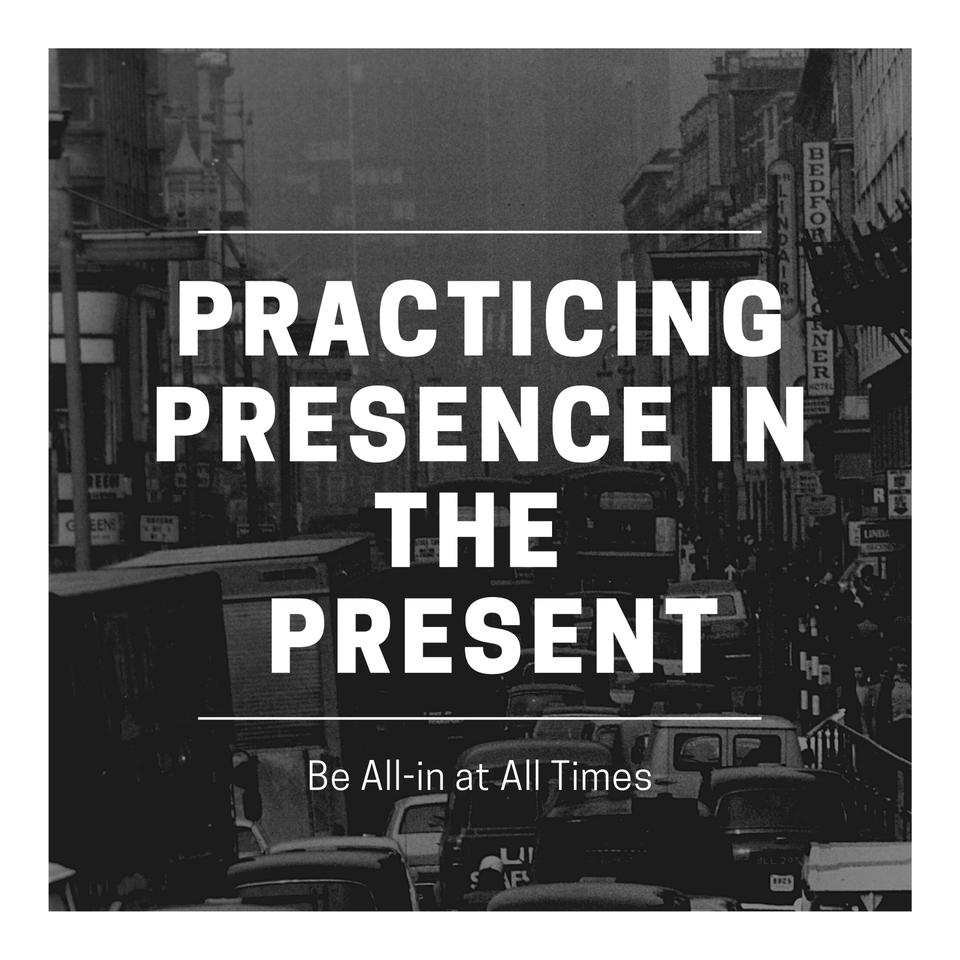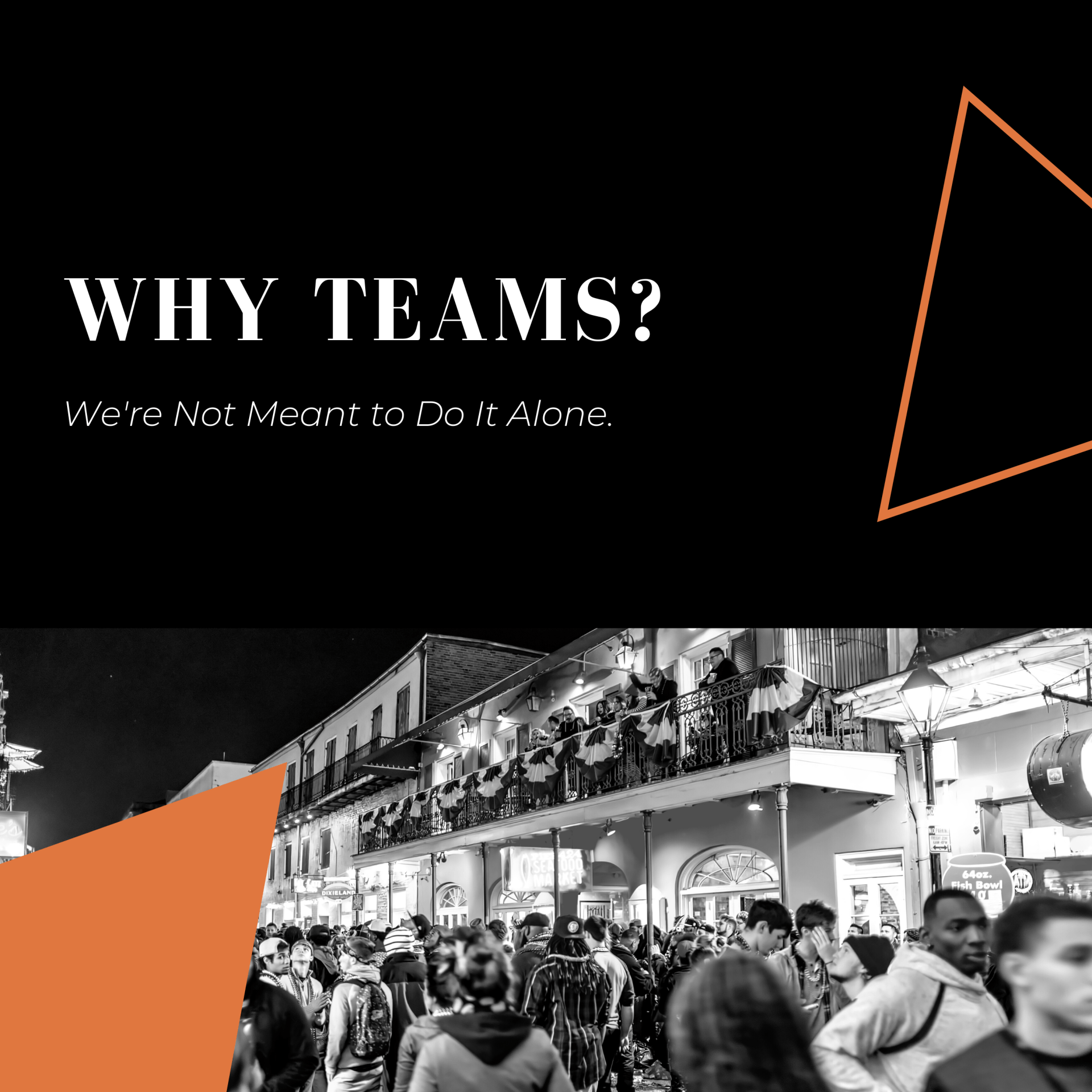Practicing Presence in the Present
Isaac Kain • March 15, 2021
3 practices to being all-in at all times

Practicing Presence in the Present:
3 practices to being all-in at all times
Recently, a new friend and I were having coffee together and were talking about all sorts of things. We got to know some of one another's story and talked about marriage, kids, professional work and aspirations, and all of the other tangential directions a conversation will go. While on one of the rabbit trails we came to the idea of being present. As a leader, mentor, educator, team member, husband and father I can think of very few things that carry as much weight as practicing presence in the present. If we can learn how to do this I believe that our businesses, organizations, and relationships will be transformed.
What does it mean to practice presence?
Practicing presence means that we are as fully engaged as we can be in the given moment without being engaged with anything else. Our lives are perhaps more complicated, busy, and filled than they have ever been while simultaneously having the same parameters that they have always had. We still only have 60 minutes in an hour, 24 hours in a day, and 7 days a week. We still only have 1 mouth and 2 ears, and, as near as I can tell, we still require everything on Maslow's
Hierarchy of Needs. We are busier but we feel less connected and more stressed. If you feel this way, you can be sure you're not alone. Your teams and companions are feeling it too.
I recently read a journal article online that said,
"According to a survey published online January 23, 2020 by the health insurer Cigna, more than three in five Americans are lonely, with more and more people reporting feelings of being left out, being poorly understood and lacking companionship." This staggering statistic is up 13% since 2018 when it was first published. Loneliness and disillusion are at epidemic levels. Why? Well, the root of this may be the content of another blog post, but there are steps we can take to mitigate some of the loneliness we are all feeling. One of the biggest steps is being all-in at all times.
How does practicing presence help my organization and team?
In 2008, Gallup published Strengths Based Leadership,
an easy to read book with content that packs a punch. In the book, Tom Rath overviews the scientific research of Gallup's scientists which resulted in what they called the three keys to successful leadership and the four fundamental needs of a team. (I will be writing a book review on this book shortly. Keep an eye out!) What I found really interesting while reading the book is that every team member, even you, needs the following basic needs met in their teams: trust, compassion, stability, and hope. Practicing presence in the present brings us a lot closer to do providing these things for our teams and ourselves. The reality is, you can transform yours and your teams lives by taking these next 3 simple, yet difficult steps.
1. Stop Multitasking
A good friend of mine is a very busy and successful businessman. I have had the privilege of working with him and his non-profit as both a consultant and communicator. In the business world, he has run his multi-million dollar corporation by multitasking. But, when we were in team meetings together it was really difficult to engage with him because he kept his blue tooth wireless earbuds in his ears during our meetings. He may have been physically engaged in our conversation but his appearance told me he wasn't mentally engaged. Additionally, the phone he placed on the table in front of him would frequently get loud text message and email alerts during our conversation which required him to glance at his phone and briefly disengage with our conversation. These behaviors made me feel as though there were more important things to him than our meetings. As a teammate, I felt undervalued and demotivated by this. We eventually talked about this and it got better over time. It's even been a point of humor between he and I, as well as other members of the team. But, the feeling that was presented when he was multitasking was palpable.
Efficiency may call for multitasking but efficacy requires focus. This is true as well when developing relationships. Healthy teams are effective teams. Healthy leadership is effective leadership. Healthy relationships are effective relationships. In all reality, we cannot, either as members or leaders of any sort of team we are in, contribute to the health of our team or the needs of our team (trust, compassion, stability, and hope) without effectively engaging with the team members. One of the best ways to build trust in your team or relationships is to be fully present when you are with them. If you're multitasking, you can't practice presence in the present. So, put the phone away while talking, take the headphones out, and do your best to zone in to your interactions.
2. Make Eye Contact
The first officer I worked for in the Army was a chaplain. His job required him to talk with soldiers, brief officers, and provide ecumenical services. At first the soldiers were happy to have a chaplain around again so they came to him for conversation and questions. His services were relatively well attended and his meetings with the top brass went okay as well. But, very quickly soldiers stopped coming to him, no one came to the services, and the top brass stopped listening to him. It was my job to be his go between so I engaged with the question of why. The answer was simple and across the board:
the man doesn't look at us which makes us feel uncomfortable and that we can't trust him. There it was. It was simple and I noticed it too. In fact, I felt the same way. He would never look at you in the eye but would always look around you which made you feel as though his answers were less than honest or at the very least he was disengaged and was somewhere else in his mind.
We need to trust our leaders and we need to trust our teammates. And, as leaders, we need our team to trust us. One of the simplest ways to do this is to look at people and make appropriate eye contact. Appropriate eye contact shows trust, empathy, and presence. A lack of this takes away from feelings of trust, empathy and presence and replaces those needs with distrust and discomfort. But, having appropriate eye contact is key. Too little eye contact cultivates distrust and too much cultivates discomfort. In the Covid world where we are all online for meetings and work this can be a bit difficult, but it may be as simple as turning on your camera and looking at it.
3. Ask Questions
Active listening shows engagement. Very rarely do you find someone naturally skilled in active listening but when you do you really know that they are engaged because they repeat back to you what you said and then ask clarifying and follow-up questions. Just last week I had an interaction with one of my students. The student stayed after class and was talking with my student teacher and I. He was naturally actively listening and because I was engaged in the conversation I asked him if he knew what active listening was. He said no so I explained it to him and then we had a conversation on how helpful it was. I was actively listening to him as well. What I didn't know until the next day when I read my email was that his parent was listening to our conversation. She wrote me a very sweet email letting me know how thankful she was that I was engaging with her student and that she felt as though her child was seen and heard and this built so much trust and stability into the relationship between myself, the student, and the parent. All I did was listen and ask questions, but that's all it took.
When we ask clarifying and follow-up questions it tells the person we are talking with that we value them and what they are saying enough to be present in the conversation. This speaks volumes and builds team health in a very real way. So often we are focused on what we're doing or consumed in our minds so we don't fully listen to others. But, by practicing presence we actively step away from what's going on so we can step into what is in front of us by listening and engaging with what is being said.
If I'm being totally honest, this post is for me as much or more than it is for you. Given my passions and the way that I'm built I'm often engaged in many things at one time which means that I don't practice presence in the present very often. But, I believe that we are created to be in healthy communities and our teams will appreciate our presence as we engage with them thereby making them healthy teams. Healthy teams and healthy leaders engage with the present. How will you practice presence in the present?

Welcome! If you're reading this it probably means that you're passionate about the same things I am: leadership and the effectiveness of the professional team you work with. Together, we will better ourselves, provide effective leadership and foster fulfilling professional cultures. In doing so, we will not only be making our professional spaces better to be in but we will be effective in our missions.

Part 2 Welcome! If you're reading this it probably means that you're passionate about the same things I am: leadership and our organization's health. Let's dive in and grow together because our organizational teams need to be fulfilling to each member and each team needs good leadership. Together, we will provide that leadership and foster that fulfillment. This is the only way that we will effective in our missions. We're working through 3 keys to effective teams right now. Last time we talked about how important it is to be a team player. Whether you're the leader or not, you're part of the professional team. Each team member has equal responsibility in the teams effectiveness and that requires everyone to consider the team and mission first. If everyone is putting the needs of the team and the mission first then every one will be cared for and the team will be effective without anyone being left out or mistreated. But, that's not all. Working on a professional team means that you are working with people which requires you to have appropriate expectations. This is our focus right now. 2. Adjust Your Expectations Accordingly Managing one's expectations is one of the most difficult tasks. It's also one of the most important tasks. I've spent hours in conversations with people I was mentoring or counseling as they talked about the damage and trauma that came with unmet expectations in their personal and professional lives. Heck, I've spent hours talking to my mentors and counselors about my own unmet expectations and their fallout. But, what I've learned throughout life, and it has certainly been reinforced in my amazing team, is that expectations are legitimate forces in our teams and organizations. We cannot take them away. We can only recognize them and adjust them to become more appropriate as we are aware of them. Every professional team maintains certain behavioral expectations for its members. I'm not talking about those kinds of expectations. Those are easy. They're generally out in the open and therefore aren't a surprise. What I'm talking about is all of the unspoken or perceived expectations that we feel and put on others and ourselves. We feel and perpetuate expectations of workload, cordiality, humor, friendship, and so much more. And, to top it all off, our expectations adjust constantly based on situational changes or how the expectations become met or unmet. The only way to manage our expectations is therefore to name them, make them public and then adjust them based on how realistic they are. One of our teammates is an absolute powerhouse. She works hard and takes a lot on her shoulders that is above and beyond what she needs to do. This isn't always something the team needed but was a behavior that we had come to expect. We never tried to take advantage of it but last year, while working on an additional credentialing and going through difficult family situations at home, she felt the pressure. In a team meeting she vented and named her expectations and how they were unmet and damaging. She felt the pressure to take it all on herself and therefore internalized it as an unsaid expectation. Additionally, she expected us to help her out but didn't know how to do that without letting go of her first expectation. By opening up and talking through these expectations as a team we were able to support her better and she was able to feel heard and understood. As a team we then had the opportunity to share out all of our other expectations gaining personal insight in our teammates, growing together as a team, and then effectively moving forward with adjusted and appropriate expectations. If my teammate hadn't shared what she was feeling and how it was affecting her, the unmet expectations may have become frustration and then bitterness. These feelings then would have colored some of the other expectations she had and eventually spilled into the relationships and or effectiveness within the team. The trick with expectations is to be open, honest, and supportive enough as a team to handle the conversations. On a side note, this is true in our personal relationships too. (Just a bonus :-) "The only way to manage our expectations is therefore to name them, make them public and then adjust them based on how realistic they are." Jane Austin wrote in Sense and Sensibility, “To wish was to hope, and to hope was to expect”. Each of us come to our organizational teams with expectations and these are tied to our hopes. When the expectations aren't met in the way that we anticipate them to be met then it's likely that frustration and even hopelessness creep in to the team dynamic which will inevitably take away motivations and effectiveness. The best way to deal with this reality is to reflect on your expectations and how possible they are. Should you adjust your expectations of others? Should you adjust your expectations for yourself? If you are the leader of the team, should you facilitate conversations about expectations and how they are being met or not? Managing and adjusting our expectations appropriately will bring peace, fulfillment, and effectiveness to your team. Next time, we're going to wrap up this series up with one of the most important keys to successful teams that you can implement right now in your team. Until then, commit to the work of being a good team member first, leader second, and let's continue to cultivate healthy effective organizations and teams. As always, I'd love to hear from you, so reach out and share with me all that you've learned and experienced in healthy teams and organizations. Sign up to be a part of the community by clicking the image below. Here you will receive free leadership and team building resources, updates on available trainings, and so much more!

For the last 4 years I have had the absolute privilege of working with an amazing team. These professionals have proven themselves as effective, creative, reflective and selfless. It's been an ideal working relationship. I am aware, however, that not all teams work as well as this one so I wanted to distill some of the secret (not-so-secret) sauce into a few points for us. My hope, as always, is for all of our teams and organizations to be both personally and professionally fulfilling. Let's get into it! 1. It's Not Always About You This first point seems so obvious to concede, but it can be so much harder to really internalize and put into practice. In order to be a truly transformative leader or a truly effective team player you need to possess and live out the same quality: selflessness. I've written on this a bit before but it bears repeating. Good leaders and good team players are, as Patrick Lencioni describes in The Ideal Team Player , humble, hungry and smart. We often look for people to join or lead our teams and organizations because of their talent or experiences but we tend to overlook this integral aspect of their character. The humble and selfless characteristic does not automatically describe a weak person as some might think. Rather, it describes someone who puts the needs of the organization, team, and teammates into proper perspective. In many instances, this requires much more strength of character than simply working for your own benefit. As a quick example, my team and I recently differed on how to approach a unit of study that we were jointly designing. I had a different perspective of where we should be moving from theirs. In the moment, we were at a standstill. The ability to bind us up and keep us from moving forward productively was in my court. I quickly had to assess whether I differed in opinion from them because of a preference or a different operational paradigm. It was simply opinion and therefore I conceded and submitted to the group so that we could move forward. This, unfortunately, doesn't happen on many teams. Team members or team leaders often hold the rest of the team hostage. I have been on so many teams where the team leader and/or team members have been in such competition for their voices to be heard that they aren't willing to concede any point. Instead, they fight for their perspective, even if it's incomplete or wrong, simply to prove their voice worthy of hearing. This approach is not only self-centered but also the antithesis of effectiveness and a thief of joy. My team and I agree that our vision, our mission, and our teammates are more important than any one voice . That's not to say that the individual voices aren't heard. In point of fact, the individual and dissenting voices are absolutely necessary, even if they result in conflict. I will discuss this further in point 3. It can become a very delicate balance to maintain but if you and your team can walk this tightrope you'll be able to be effective and fulfilling team. Next time... Next time , we're going to be talking about everyone's favorite thing to hate: conflict. Until then, commit to the work of being a good team member first, leader second, and let's continue to cultivate healthy effective organizations and teams. As always, I'd love to hear from you, so reach out and share with me all that you've learned and experienced in healthy teams and organizations.

Let's face it, there's a lot that everyone is dealing with right now. Our personal and societal lives are turbulent and they extend into our professional and work lives. Because of this we are having some very difficult conversations and interactions in our professional and team environments which are both personal and systemic in nature. Some times these conversations go okay and sometimes they have a lasting effect of negative feelings and relational fissures that persist. Today, I'm going to give you five foundational elements your team must have in order to engage in healthy, honest, and effective difficult conversations. ________________________________________________________________________________________________________________________________________________________ A Little Background: I'm currently on two professional teams. One team I'm very open with and one team I am not as open with. My limited openness isn't because of the people or even because of a real conscious choice. There is a constraining reality that some of you may relate to. I only meet with them for a very short time every day and we always have more work to do than can get done in that short time so we don't have a lot of superfluous conversation. The other team I'm on is the opposite. We work hard but we have more time to accommodate for down-time and a lot of concerted effort working on our team health, communication patterns, and general team dynamics. Recently, we had a difficult conversation in the first team. It was a necessary conversation as we were talking about very important systemic issues that need to change within our bigger organization and how they play out in our specific experiences. We were all in agreement that they need to change but we were looking at the means of approach from different angles. This should have been okay but it was awkward to say the least. I left that conversation feeling nervous, isolated, and confused. I spent the rest of the day and evening replaying the 20min conversation in my head. Why was it so awkward and contentious? Why, if we're trying to move in the same direction, does it feel like we're at odds? Why can we have open conversations in some teams and not others? Was I respectful enough? Did I listen enough? Was I clear enough? And the questions kept coming. I began to think through what healthy teams need from their leader and organization (Trust, Compassion, Stability, and Hope - elements I commented on in another post ) and how that relates to all of the various facets of our teams and organizations. In order to have healthy and difficult conversations we need the same things. The team that I am more open with has these elements. It doesn't mean that we agree all of the time. In fact, we disagree often , but we still appreciate one another and are productive as a team. I would eve argue that disagreement is just as important as agreement in a healthy team because it challenges norms and previously held conceptions. Disagreement isn't inherently bad. It can be an engine for creation and learning. For these reasons we are all a lot more open with one another in my second team and are able to participate in some very difficult and healthy conversations. All of our organizations and teams are built upon people. People are diverse with diverse perspectives, talents, and goals. With all of the diversity there is beauty, like a glorious mosaic. In order to make the organization or team work well and for all of the people to mesh together in the best possible way, there needs to be space for each of their individual perspectives and functions to be present. Here are 5 foundational elements that must be present in order to have effective hard conversations, of both personal and global subjects, and thereby allow your team to be the best it can be. 1. Share Downtime When Possible Downtime is of utmost importance in teams. Downtime allows team members to be their authentic selves and share openly in conversation. Downtime can happen in both large and small amounts, but the key is to use your time wisely. In order for our teams to handle difficult conversations we need to be authentic. Each of us, even the most authentic, present multiple versions of ourselves. I behave very differently with my kids than I do with my colleagues. Sharing downtime, even if it's momentary, blends the different versions of ourselves so that our teammates get to know us in a fuller way. This is why military teams are so tight. When your team knows you, and knows that you are who you are presenting, it goes a long way into eliminating assumptions. When we don't operate in assumptions but in understanding, it eliminates all sorts of misconception and miscommunication. 2. Have Regular Open Conversations Sharing downtime, even if minimally, allows people to open up in conversation and talk casually. This will thereby bring in some natural pathways to both common and divergent perspectives. It also creates opportunities to practice hard or inquisitive questions in order to really get to know one another. Having these natural and sometimes less intensive pathways to discussions creates a stabilizing framework that will allow you to have more difficult and complex conversations. It may sound silly, but if I find common ground with a teammate about musical preferences or experiential backgrounds I'm building relational investments with them. These conversations also give the opportunity for places that I call "harbors of safety". These are moments when you realize that you don't share the same perspective but that you can still work together for a shared goal and with shared values. Harbors of safety are crucial to develop foundationally so that when the really big discussions and differences come you realize that you can still work together even if you're on different sides of a proverbial fence. This may sound as if I'm suggesting that you share all of your family vacations together with your working team. I'm not, although, if that works for you, that's cool. What I am suggesting, however, is that when we share downtime together we really get to know our teammates on a whole different level. Remember, our goal for healthy organizations and healthy teams is not single mindedness, but many parts working together to realize a common corporate vision. 3. Choose Your Words Carefully Wars have been waged over carelessly said and ill-timed words. Teams have also been destroyed because of them. Everyone has different levels of comfort and different styles of humor. Sometimes they overlap and sometimes they don't. For instance, my family (i.e. my extended family) tends to have what they call "dark humor". They deal with difficult situations by joking about them or being sarcastic. I certainly followed suit in my younger adulthood, but I quickly realized that this wasn't always received well by all of the teams I worked on. I needed to learn how to choose my words carefully. Just because I didn't intend to make anyone uncomfortable or offended, my intentions were secondary to the impact they made. This extends into all sorts of other spheres and topics in a conversation. Our tongue is a double-edged sword. It has the power to build, encourage, and unify. It also has the power to tear down, separate, and destroy and can do so independently from our intentions. Sometimes this happens intentionally and sometimes unintentionally. We need to mind our tongue and remember that sometimes making a point relies as heavily on our word choice and knowledge of the audience as it does about sentiment. 4. Be Patient and Slow to Frustration In as much as careless words have an impact, we as the receiver of those words have a responsibility as well. This concept is a bit more complicated in the present so let me be clear on what I mean. Sentiments of the "isms" (i.e. racism, sexism, et al) should never be tolerated. We all need to be united on this. With that said, we all still need to be a united team as well. Something that I learned a long time ago in the Army is the necessity of direct conversations. They can be uncomfortable sometimes, but they are imperative. In fact, this is what I'm writing about in this post. If we value our teammates, our team, and our organization then we also have a responsibility to them. Sometimes, that means that when we are offended by words that were said, we need to directly ask about the intended meaning and genuinely seek to understand and/or redirect the person. I'm not suggesting that we let things slide, but sometimes inarticulate utterances have unintended consequences that could be avoided through conversation. This prevents these unintentional utterances from creating problems. If these persist after the conversation, however, then this is a pattern and unhealthy patterns cannot be allowed in healthy teams. You, as a teammate, have a responsibility to both be careful of your words and mindful of your thoughts and emotions. You, as a leader, have a job to cultivate health and protect your people. In order to do both of these things, we need to be mindful of ourselves and those around us. And, not for nothing, if you do have to discipline someone for their words or behavior, it's always better to do it with a clear head rather than volatile emotions. 5. Let Things Go When my wife and I were wedding photographers we heard a lot of advice dolled out to the brides and grooms. Some of it was good and some of it went right into the " Did they really just say that ?" category. One of the most common pieces of advice we heard was, "Don't go to bed angry". I think a lot of people take this a bit too literally and maybe push too hard to resolve really hard things too quickly. Hard things and big offenses can take work to resolve. However, the sentiment behind this advice is sound. At all points, if we care about our team, our shared vision, and our teammates, we need to push against bitterness as much as possible. Bitterness generally occurs in one of two instances. The first is when our unmet expectations or offences are not addressed and then fester. The second is when we continue to perseverate after the situation is resolved. The first way bitterness grows was addressed, at least in part, in the previous four foundational elements. The second, is in the skill of letting things go. When things have been addressed and they have been resolved, it's extremely unhelpful for a team to continue to fixate on them. Life is still messy and we don't always get the resolutions we want but if we've had Focusing on mistakes only breeds conflict and bitterness. Don't take the difficult conversations to mean that there is a difficulty in collaboration. The reality is that this list is only part and parcel of how a healthy team communicates or what the foundations for healthy team communication are. However, a healthy team needs to have these things in place in order to be able to withstand the necessary hard conversations that come in our organizations and teams and then move on into healthy collaboration. After this post, I am now convicted to bring these elements to both of my teams because they are both of equal importance. If you have any other thoughts, comments or ideas please share them.

I have experienced a fair amount of intense situations. I trained to be a first responder and went through a an intense police training program, I went through boot camp and served in the Army, I moved overseas with my family and additionally have experienced a handful of near-death experiences. But, nothing prepared me for the intensity of this assessment. My wife and I were preparing to start a church with our denomination and we had no idea how rigorous the process was going to be . So, there we were, in a 5 day intensive pressure cooker where we were thrown together with five other couples who were also interested in being church planters. We immediately went to work. They tasked us, interviewed us, watched every move we made and evaluated us. There was nothing that was said or done that wasn't a test. Even our meal time conversations were subject to scrutiny. I don't think I got more than 3-4 hours sleep for the entire 5 days. We took personality tests, mental health evaluations, and psychological exams. We were under a microscope every moment. It was here where I was asked the hardest question, "Isaac, what's your vision?" They didn't only want to know if we had the requisite skills or work ethic to begin and run a church, they wanted to know if we were emotionally healthy enough to endure the work. It was a grueling experience. I hadn't ever experienced anything like this, even in the Army. It was here, toward the end of this experience and in my weariest state, where I was asked the hardest question I was asked up to this point in the week, maybe in my life, "Isaac, what's your vision?". This question has stuck with me and I have thought about it so many times. Much of my life and my experiences have been marked by the joy that comes with wandering, exploration, and experience. I'm fond of the Tolkien quote, "Not all who wander are lost". When my wife and I were first married we would just get in the car and go for drives. No real destination. No real plan. Just enjoying the journey and surprises together. I really like fluidity of taking what comes and allowing myself to be directed in new and surprising areas. But, here, they were asking me to do something else. As a leader, you have to have a direction. You have to have a vision and I was confronted with the fact that I had a limited vision that appeared murky as if I was looking at it through the dirty windows of my mini-van in the dead of Upstate New York winters. I don't remember exactly what I said, but it was sufficient enough for the time and they eventually deemed us approved to do what we had initially set out to do. This question touched me to the core, however. Most of us have a general sense of what we want but we don't always know where to go or how to get there in order to make it happen. This is true for both our personal and professional lives. In a professional experience, I have seen this too often. Without a vision we wander. Without vision our people suffer. Without vision we exhaust ourselves and our resources. Without vision morale plummets and loyalty wains. Having a vision is at the core and foundation of our success. A shared vision is key to developing your team. The vision is not just where you are but where you are going. It drives everything you do. A shared vision motivates, encourages, and challenges every member of the team. It may come from the top but it has to be adopted and bought into by every member of the team, from the least to the greatest. A shared vision is key to developing success for you and your team. Going on a trip without a map will get you somewhere but it may not get you to where you want to go. Leading a business or a team is not the same as my wife and I enjoying one another's company and wandering aimlessly and joyfully. Without a clear vision you and your team will suffer, you will flounder, and you will waist valuable time, talents, and energy. You will undoubtedly have confusion, disputes, and a lack of motivation which will thereby decrease morale, efficacy, and team buy-in. Take a moment right now and do a little reflection. Here are some questions to ask yourself: Do you know what your vision is? Are your current activities and behaviors aligned with your vision? Are your teammates and employees aware of your vision? Do your teammates and employees agree with, understand, and buy-in to your vision? If you answered no to any of these questions, now is your time to take a step back, analyze, reflect, and speak out your vision. Ask others for their honest input and be vulnerable to accept it, even if it's not what you want to hear. Your journey may have begun before now, but today is a new day. Today is the day where you reevaluate your vision and take the next step in your journey. Every step is new. Every step is exciting. Every step is commitment. Be committed to your vision and your team. You won't get where you want to go without either of them.

I have a fascination with modern-day pioneers. I'm not talking about people doing new things in a particular professional field, I'm talking about people who live so remotely they have to hunt, fish, forage and grow their own food. These are men and women who are truly remarkable in the skills that they possess. They build their own existence from the ground up, relying only on their independence and individual ability. But, they might have a weakness... they are individual. "Alone in the Wilderness" , a documentary about Dick Proenneke settling his own spot in Alaska was my gateway drug into this 16 year rabbit trail of modern-pioneering research. Well, I suppose I can't say it's true research. I really just watch a ton of YouTube videos and read accounts of people doing what I wish that I could. In the late 1960s, Proenneke left his home in the lower 48 and moved to the wilderness in Alaska. Hundreds of miles away from any other established person or town, he built a a cabin from scratch, stockpiled what he needed, and lived a solo existence reveling in his oneness with all that he surveyed. His independence and prowess astounded me and I was struck by the idea that he could live alone for so long. What I didn't understand then but I do now is that both his survival and his story's success were the results of a team and not just an individual. The solo life is a fallacy. The solo life is a fallacy. No one who has ever done anything great has ever done it alone. Proenneke relied on a friend and bush pilot to bring him supplies and documentarians shared his story. Elon Musk relies on his teams to bring his visions into reality. Even Oprah relies on teams of producers, writers, stylists, and so many others to impact the world. Yet, those of us who run small businesses, manage employees or teams, and begin entrepreneurial endeavors wear our abilities and independence as badges of honor. What if the badges of honor are creating toxic environments that stunt the growth of you and those around you? Solo is not reality, nor can it be. We are only successful if we have a team and we are only successful if we use our team appropriately. I'm not suggesting that you always have to do everything with others. I can feel the anxiety building of those of you reading this who are introverts. Relax. Take a breath. I understand and need time to myself as well. Independence and space are good things. I need them too. In fact, there's a reason we have sayings like there are too many cooks in the kitchen . It's true. Sometimes there are. What I am suggesting is that we need the support of others to help us grow and transversely they need ours. We were created to be with others. It's in our DNA and if we're going to be successful leaders or managers then we have to realize that just as it takes a village to raise a child it takes a team to be successful. When I was in the Army we used to muse that we were just small cogs in a big machine. Maybe on the large scale that was true but on the small scale the soldiers around me were anything but. Our success was dependent upon those around us and I was responsible for theirs as well. I rose through the ranks quickly and was an NCO (Non-commissioned Officer) before I was old enough to buy beer. This was my first real taste of personal success and at one point I thought I got there on my own. But, that's not true. I was successful because my team supported me, challenged me and gave me opportunities that that I took advantage of. To be successful you must be driven, you must work hard, you must dedicate yourself and seize every opportunity that comes your way. You also need the necessary infrastructure to give you those abilities and opportunities. Everyday, school teachers see this sad reality. Students who have support are more successful than those who don't. It's the honest and hard truth. What may be just as hard to see for teachers, however, is the student who has support but doesn't use it. In this instance, struggle is a choice. I would venture to guess that some of us who are struggling are effectively choosing to do so because we don't have or aren't using a team. You aren't alone in the wilderness. You aren't alone in the wilderness. Chances are you aren't hundreds of miles away from your nearest neighbor. There are people around you and you won't be successful until you see them and work with them. Your team won't be successful until you realize that you need each other and need to work together. The burden of work and success are not yours to bear alone. We were meant to live, work, and be together. Your business, organization, and families are meant to function in tandem, not separately. In order to live successfully, we need to realize , first, that we can't do it alone.


